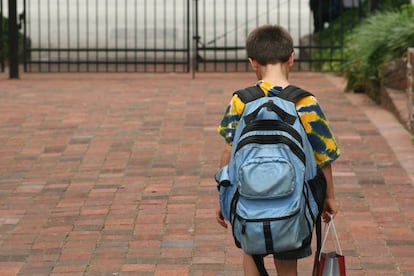Controversy in Argentina, as parents force out child with Asperger syndrome
Celebratory messages on WhatsApp go viral after pressure sees school move youngster from class

“Finally some good news! It’s about time they valued the rights of 35 kids and not just one.” “How great for the kids! They can work in peace.” These were the celebratory messages exchanged via a group chat on the WhatsApp messaging service that brought to light a case in Argentina involving a child with Asperger syndrome. The youngster’s mother has now spoken out, after pressure from other parents saw her son removed from his class at the San Antonio de Padua religious school in Merlo, Argentina.

A representative for the school, Gustavo González, told the Argentine television station C5N that the school had been working with the child for four years and trying different strategies. The decision to move the child to another class was signed off by all the parents. “What we did not expect,” says González, “was this celebration and joy for the decision and this is bad. It’s necessary that we talk to these parents. This is not normal.”
The case came to light after Rosaura Gómez, the aunt of the expelled child, shared screenshots of the WhatsApp chat and denounced the women’s actions on a Facebook post, which quickly went viral.
It’s necessary that we talk to these parents. This is not normal Gustavo González, representative for the school
The child’s mother, Paola, spoke to the TN news network about the situation, explaining that she has been working with the school to try and maintain her son in the same class, but the pressure from other parents was too strong. “The child likes to have friends, he tries, but sometimes he doesn’t understand the games his friends are playing,” she said.
Asperger syndrome is one of the most common and least known of the Autism Spectrum Disorders (ASD), which can generate prejudice and discrimination. “Asperger affects social interaction, verbal, and nonverbal communication,” explains the Spanish Confederation for Asperger. The confederation points to article 24.1 of the UN’s Convention on the Rights of Persons with Disabilities for a case of discrimination against the school. The convention requires a right to education on the basis of equal opportunities and to allow people with disabilities to develop dignity, self-esteem, and their mental and physical aptitudes in a free society.
Paola defends the school, which is in a middle-class suburb of Buenos Aires. She had a meeting where they agreed that the child would split his day among several classes so he doesn’t lose contact with his friends. “I take my hat off for how the school has been run,” she said. “They were overwhelmed by the pressure from the parents.”
She blames the other parents, who made life impossible for those working at the school until they gave in. According to Paola, they even went on strike to demand that they move the child to another class. “It was in July. Of the 35 children, there were only 11 in class that day. I sent my son to school as if it were any other day. He told me there were few students in class and I thought it was because of the rain,” she continued. “I was naive. Another mother later told me what happened. That’s how the parents got my son out.
I put myself in these mothers’ shoes, but they did not do the same for us Paola, mother of the expelled child
“Most schools in Argentina are inclusive,” Paola explained. “But these are social issues. I put myself in these mothers’ shoes, but they did not do the same for us. We now have an agreement with the school that he can have a flexible schedule.”
What bothers Paola the most is seeing that the other mothers do not seem remorseful over the leaked messages.
One of those mothers, Cristina Peduzzi, also spoke to the Argentine media to defend herself. She claimed that “they never discriminated against the child,” and says that since the posting of the conversation in the WhatsApp group she has received more than 5,000 messages with insults.
Claudia, who had written in the group chat that the news was “a relief to us,” said that the child was received “very kindly” when he came to class two years ago, but after several violent episodes parents began to protest. “We asked that the child be moved away until he is better. We were thinking about him and our children,” she says. “This year, he seriously assaulted other children.” The mother explains that these aggressions consisted of the child throwing objects at others. The controversy is growing in Argentina and the school has been forced to seek an immediate solution.
English version by Debora Almeida.
Tu suscripción se está usando en otro dispositivo
¿Quieres añadir otro usuario a tu suscripción?
Si continúas leyendo en este dispositivo, no se podrá leer en el otro.
FlechaTu suscripción se está usando en otro dispositivo y solo puedes acceder a EL PAÍS desde un dispositivo a la vez.
Si quieres compartir tu cuenta, cambia tu suscripción a la modalidad Premium, así podrás añadir otro usuario. Cada uno accederá con su propia cuenta de email, lo que os permitirá personalizar vuestra experiencia en EL PAÍS.
¿Tienes una suscripción de empresa? Accede aquí para contratar más cuentas.
En el caso de no saber quién está usando tu cuenta, te recomendamos cambiar tu contraseña aquí.
Si decides continuar compartiendo tu cuenta, este mensaje se mostrará en tu dispositivo y en el de la otra persona que está usando tu cuenta de forma indefinida, afectando a tu experiencia de lectura. Puedes consultar aquí los términos y condiciones de la suscripción digital.








































